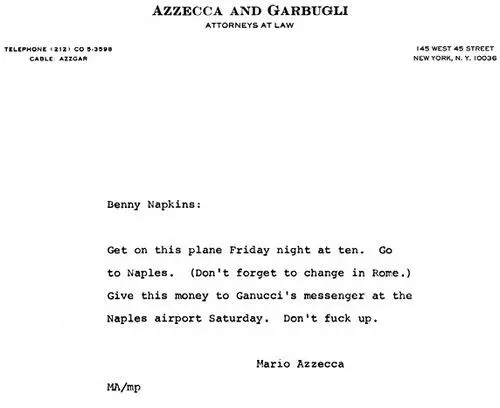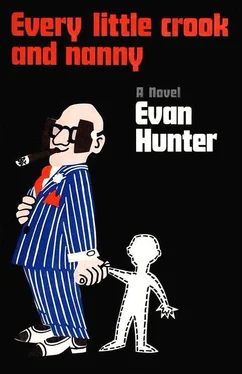“I had a very interesting time too,” Benny said, “but I haven’t got time to discuss it right now. I got to get dressed and go up to Harlem for the work, and also there’s some other pressing matters I have to attend to.”
“Oh, sure,” Freddie said. “Maybe some other time.”
“What’s this?” Benny said, and looked at the bulging envelope in his hands.
“It’s from Mario Azzecca,” Freddie said. “There’s instructions inside.”
“Did you read the instructions?”
“Would I read something marked personal to you?”
“I guess not,” Benny said.
“Also, I can’t read,” Freddie said, and shrugged.
“Well, thank you for bringing it over,” Benny said. “I’d offer you a cup of coffee, but Jeanette Kay is still asleep, and I like her to sleep herself out.”
“Oh, sure,” Freddie said. “Some other time, maybe. Then maybe we can also discuss this girl I had last night who...”
“Some other time,” Benny said.
“Yeah,” Freddie said, and left the apartment.
Benny sighed and went into the kitchen. He put down the bulging envelope, afraid to open it because he was certain that anything from Mario Azzecca would only be some new calamity. He put the coffeepot on the stove, sat down at the kitchen table, and stared at the envelope. He was surprised that The Jackass had not contacted him after last night’s stickup, but maybe The Jackass had decided to take a plane to India or someplace. If there was one thing you could never trust it was a crook, especially if he happened to be a dumb one. The Jackass had probably never seen that kind of money in his entire life; it was easy to imagine it going to his head. Benny could visualize him taking off all his clothes, except the stocking, and then laying down naked on his bed and rubbing himself all over with those crisp green bills. And then he had probably got on a plane to India.
Benny wished he was on a plane to India.
He had been that close, that close, to getting the ransom money legitimately, if only The Jackass hadn’t been such a jackass. But then again, he himself was the one who’d figured out the heist, so he couldn’t very well blame the poor soul, who’d only followed instructions — except that the poor soul was a very larcenous bastard who had probably decided to keep all the marbles for himself. Well, we all make mistakes, Benny thought. Like that time in Chicago, he thought, and looked at the envelope again, and wondered what kind of trouble Azzecca was sending him on a nice Friday morning.
The coffeepot was perking. Benny got a cup and saucer from the cabinet and set it on the kitchen table. He kept stealing sidelong glances at the envelope each time he passed it, as though by constantly referring to it, it might miraculously disappear.
The time in Chicago was a very natural mistake, Benny thought. Why can’t they ever let a man forget things? He poured coffee from the pot and looked at the envelope again. How was he supposed to know that the man who was opening Domizio’s Italian Restaurant was none other than Carmine Ganucci’s brother? Benny had followed the same routine he always did when a new restaurant was opening in Chicago. He had paid a visit to the establishment and casually mentioned that several interested parties would like to collect the garbage and supply the linen. Domizio had said, “Get the hell out of here, Dummy.” So that night some of Benny’s friends had inadvertently thrown a garbage can through the new plate-glass window of Domizio’s splendid establishment. It really served Domizio right, because if a man’s name was Domizio Ganucci, he shouldn’t go changing it to Domizio Galsworthy, what the hell kind of a name was that for a man running an Italian restaurant? And with a fabulous heritage like his? A member of the Ganucci family? Sometimes Benny simply couldn’t understand people’s motivations. What’s in a name? he quoted silently, That which we call a rose by any other name would smell as sweet, and then shrugged and thought, Rose is a rose is a rose is a rose, no? and tried to consider the more fortunate aspects of the episode, the most felicitous of which had been the fact that he hadn’t woken up in the Chicago Sanitary and Ship Canal the next morning.
Instead, Carmine Ganucci had arrived personally from New York to report that he understood the mistake, of course, it was an honest mistake, but the plate-glass window had cost his dear brother Domizio one thousand two hundred and fifty dollars, and this amount would be deducted from the money due Benny as his percentage of the garbage and linen business. In the future, however, Benny would no longer be getting a percentage from that profession. Instead, Benny was being asked to transfer to New York, where there was an excellent opening for a salaried pickup man in East Harlem, if Benny was interested in the job. The position would not pay as much as he was accustomed to earning, but Benny had to understand that plate-glass windows did not grow on trees. And whereas the entire incident had certainly been highly amusing, it was also pretty damn stupid to try to shake down the brother of Carmine Ganucci, did Benny think he understood that?
Benny thought he did.
He thanked Ganucci for allowing him the opportunity to work in a nice city like New York, especially in a nice location like East Harlem, and then he took a walk over to Thirty-first Street, and looked down at the canal and said ten Hail Marys, aloud, to make sure somebody heard him.
We all make mistakes, he thought, but it did seem he was making more than his share of them lately. He should have told Nanny that she had picked someone who was really too small a potato to be handling the job of getting back Ganucci’s little bastard of a kid. That was what he should have done in the beginning. But, failing that, he should never have tried something as stupid as holding up a card game, especially when somebody as dumb and as sneaky as The Jackass was involved. He wondered where that dumb, sneaky jackass was right this very minute, and then he looked at Azzecca’s ominous envelope and decided he had better open it and find out what was in store for him. He still had $216.00 in the bank, and that would certainly take him to Schenectady at least, if not Hawaii or India. Benny had an aunt in Schenectady who ran a hero stand.
He sipped some more coffee, put down the coffee cup, apprehensively picked up the envelope, and slid off the rubber band.
There seemed to be fifty thousand dollars in the envelope, in hundred-dollar bills.
There also seemed to be a round-trip ticket to Naples in the envelope.
And also a letter:

Benny read the letter again. He counted the money again. He looked at the ticket again. He now had the fifty thousand dollars some madman of a kidnaper had demanded for the safe return of Carmine Ganucci’s son. The only trouble was Carmine Ganucci wanted the money taken to Naples.
For the second time in twelve hours, Benny wanted to weep.
The best fence in town was a man named Bloomingdales, not to be confused with the store of the same name minus an apostrophe. Bloomingdales, the man, had an apartment on 116th Street, just off Lexington Avenue, and it was conceivably the busiest little bargain walk-up in all of East Harlem. People came from near and far to view the merchandise on display in Bloomingdales’ four-room railroad flat. It was rumored that Bloomingdales had once exhibited a stolen grand piano in his kitchen, but Dominick the Guru had never actually seen the Steinway, and was disinclined to accept the story on faith alone. Dominick had, however, seen goods of every conceivable description in those four brimming rooms, and had on occasion been tempted to merely trade his own stolen merchandise for one or another item on display. Radios, television sets, toasters, gold watches, gold pen-and-pencil sets, stereos, umbrellas, cloth coats, fur coats, lamps, gold necklaces and rings, musical instruments, chessmen and boards, a complete set of the novels of Charles Dickens bound in hand-tooled leather, crystal, china, bicycles, tricycles, and once even a Honda, all of these and more, much more, could be found in Bloomingdales’ upstairs bazaar at any day of the week, Saturdays and Sundays included. A person was unlikely to discover silver watches, rings or necklaces, sterling flatware or even silver plate in Bloomingdales’ stock because he generally laid such items off on The Silver Fox, who was expert at determining their value, and who catered to a clientele exclusively interested in sauceboats, ladles, serving platters and other silver pieces in any shape or size. But anything else, ranging from the smallest transistor to the largest combination washer-dryer, with prices starting as low as five dollars and ten cents, and soaring as high as three thousand dollars (the reputed asking price for the Steinway Dominick had never seen) was available to the bargain hunter who didn’t mind running the risk of being charged with violation of Section 1306 of the New York State Penal Law, succinctly defined as Buying, receiving, concealing or withholding stolen or wrongfully acquired property. Moreover, the thieves themselves — shoplifters, pickpockets, burglars, and assorted holdup men and robbers — found it rewarding to deal with Bloomingdales because he was uncompromisingly honest, and paid top dollar besides for whatever they brought to him. The only complaint Dominick had was that Bloomingdales was all the time yelling about his appearance.
Читать дальше













